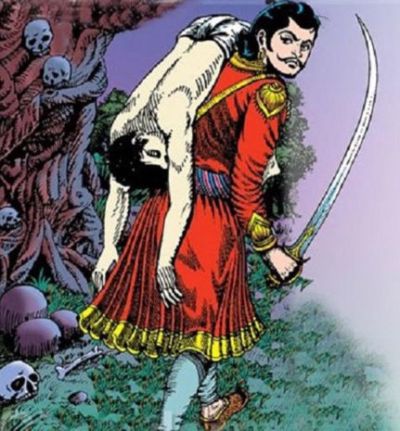“My mind is tortured at the thought of your feet, that deserve to walk on flowers, walking on thorns instead. It seems strange that the dust raised by the wind and falling on your faces, makes us pale instead, and the fury of the fierce sun, that falls on your soft bodies, burns us instead…”
“So tell us why you both are here, for we are unable to bear the distress of seeing you in this pitiful condition!”

इत्य् उक्ते चण्डसिंहेन राज्ञी निःस्वस्य सा शनैः ।
लज्जाशोकाकुला तस्मै स्वं वृत्तान्तम् अवर्णयत् ॥ १२,३१.४७ ॥
ततो निःस्वामिकां मत्वा ताम् आश्वास्य च सात्मजाम् ।
स्वीचक्रे मधुरैर् वाक्यैश् चण्डसिंहो ऽनुरञ्जयन् ॥ १२,३१.४८ ॥
आरोप्य चास्वयोः पृष्ठं सपुत्रस् तां सपुत्रिकाम् ।
निनाय वित्तपपुरीसमृद्धां वसतिं निजाम् ॥ १२,३१.४९ ॥
सापि जन्मान्तरगतेवावशाङ्गीचकार तम् ।
अनाथा कृच्छ्रपतिता विदेशे स्त्री करोति किम् ॥ १२,३१.५० ॥
ततस् तां सूक्ष्मपादत्वाद् राज्ञीं सिंहपराक्रमः ।
चण्डसिंहसुतस् तत्र भार्यां चन्द्रवतीं व्यधात् ॥ १२,३१.५१ ॥
तत्सुतां तां च लावण्यवतीं नृपतिकन्यकाम् ।
बृहत्त्वात् पादयोर् भार्यां चण्डसिंहश् चकार सः ॥ १२,३१.५२ ॥
प्राग् घि सूक्ष्मबृहत्पादमुद्रापङ्क्तिद्वयेक्षणात् ।
प्रतिपन्नं तथा ताभ्यां सत्यं कश् चातिवर्तते ॥ १२,३१.५३ ॥
एवं पादविपर्यासात् ते पितापुत्रयोस् तयोः ।
दुहितामातरौ भार्ये जाते श्वश्रूस्नुषे तदा ॥ १२,३१.५४ ॥
कालेन च तयोस् ताभ्यां भर्तृभ्यां जज्ञिरे द्वयोः ।
पुत्रा दुहितरश् चैव तेषाम् अन्ये ऽप्य् अथ क्रमात् ॥ १२,३१.५५ ॥
इत्थं संप्राप्य तौ चण्डसिंहसिंहपराक्रमौ ।
तस्थतुस् तत्र लावण्यवतीं चन्द्रवतीं च ते ॥ १२,३१.५६ ॥
When Caṇḍasiṃha said this, the queen finally gave in, and with tears in her eyes, she narrated the whole story.
Caṇḍasiṃha felt emotional, and comforted her and her daughter, and with kind words, beseeched them to become members of his family. They agreed, and so the four of them set out to Vittapapurī, where Caṇḍasiṃha lived in a huge palace, with guards and servants.
The queen was lost in thought as she entered the city. She felt that she had taken on a second life. What else could a lady, with her daughter in tow, do in a foreign land?
Then Siṃhaparākrama, the son of Caṇḍasiṃha, made Candravatī his wife, on account of the smallness of her feet. And Caṇḍasiṃha made her daughter, the Princess Lāvaṇyavatī, his wife, on account of the largeness of her feet.
For this was the agreement that father and son had previously, based on the sizes of the footprints that they saw, and which respectable person can break a sworn agreement?
So, because of the misjudgment of the size of their feet, the the daughter became the wife of the father, and the mother the wife of the son; and so the daughter became the mother-in-law of her own mother, and the mother became the daughter-in-law of her own daughter. And in course of time both of them had by those husbands sons and daughters, and they also had sons and daughters in due course of time. So Caṇḍasiṃha and Siṃhaparākrama lived in their city, having obtained as wives Lāvaṇyavatī and Candravatī.”
इति व्यावर्ण्य वेतालस् तदा पथि कथां निशि ।
स त्रिविक्रमसेनं तं पप्रच्छ नृपतिं पुनः ॥ १२,३१.५७ ॥
तयोर् मातादुहित्रोर् ये पुत्रपित्रोस् तयोर् नृप ।
सकाशाज् जन्तवो जाताः क्रमाद् उभयपक्षयोः ॥ १२,३१.५८ ॥
ज्ञात्वेदं ब्रूहि मे तेषाम् अन्योनं के भवन्ति ते ।
पूर्वोक्तः सो ऽत्र शापस् ते जानानश् चेन् न वक्ष्यसि ॥ १२,३१.५९ ॥
The Vetāla finished his story, and then addressed King Vikram and said…
“So tell me, o King, about the children who were born in the course of time to the mother and daughter by the son and the father…what relationship did they bear to one another?”
“Remember, if you know the answer, and don’t tell me the truth, your head will burst into a hundred pieces!“
to be continued…
